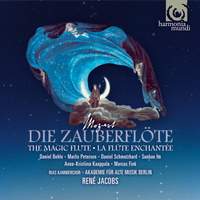Recording of the Week,
Mozart’s Die Zauberflöte from René Jacobs
One of the most anticipated releases of the autumn is a new recording of Mozart’s Die Zauberflöte (The Magic Flute) from René Jacobs. It is his sixth Mozart opera in a projected complete series for Harmonia Mundi and, while always controversial, the series has attracted a lot of followers and this latest one looks set be become one of the biggest sellers of the year.

Die Zauberflöte presents a slightly different challenge to the previous five Mozart operas Jacobs has recorded as, while the excellence of Lorenzo Da Ponte’s librettos for Don Giovanni, Così fan tutte and Le nozze di Figaro is well-documented, there is generally a much lower opinion of Emanuel Schikaneder’s libretto for Die Zauberflöte. This, combined with the fact that Die Zauberflöte is a Singspiel (where the dialogue between arias is spoken rather than sung) has meant that a general trend has grown up to cut as much of the dialogue as possible so as not to “interrupt Mozart’s superior music too much”. Jacobs fiercely disagrees with this opinion and believes that the real drama is in the words, and that Schikaneder text is every bit the equal to Mozart’s music. He therefore doesn’t cut anything, but instead uses various musical effects to enhance the text (and drama) where appropriate. These take the form of sound effects from the orchestra (especially the percussion), improvisation on the fortepiano and vocalising by the singers during the dialogues. In the booklet there is a well-written and very interesting essay by Jacobs which supports this approach, and there is certainly some historical evidence of this sort of technique being expected by Mozart and Schikaneder.
So, the big question is does it work? Well, I’d say, with slight reservations, yes. In the theatre or on DVD I think it would work even better as you’d be more drawn into the dialogue passages. On CD, to ears unfamiliar with hearing the dialogues performed in this way, it does sound a bit post-modern at times, but there is nothing worse than being bored, and if you’re performing this opera without cutting any of the libretto, that is a big possibility. But bored you most certainly are not, and the way the dialogues frequently pick up a tempo or end in a key which leads straight into the next aria actually adds to the dramatic whole, and the more times I’ve listened to it the more I am convinced that this really does work.
Elsewhere the performance lives up to everything we have come to expect from Jacobs conducting Mozart – the cast of mostly young singers is uniformly excellent with Daniel Behle’s Tamino one of the finest I have heard. Tempos are generally on the fast side compared to what we are used to, and the orchestra (Akademie für Alte Musik Berlin) and chorus (RIAS Kammerchor) on top form.
In summary then, an exciting new vibrant recording of a well-known work which has much to recommend it, and much to enjoy within. I’ve put a trailer on the website where Jacobs talks about the dialogues and also what else he is trying to achieve in his new recording. Enjoy!
Mozart: Die Zauberflöte, K620
Daniel Behle (Tamino), Marlis Petersen (Pamina), Daniel Schmutzhard (Papageno), Sunhae Im (Papagena), Anna-Kristiina Kaappola (Königin der Nacht), Marcos Fink (Sarastro), RIAS Kammerchor & Akademie für Alte Musik Berlin, René Jacobs
Available Formats: MP3, FLAC, Hi-Res FLAC



